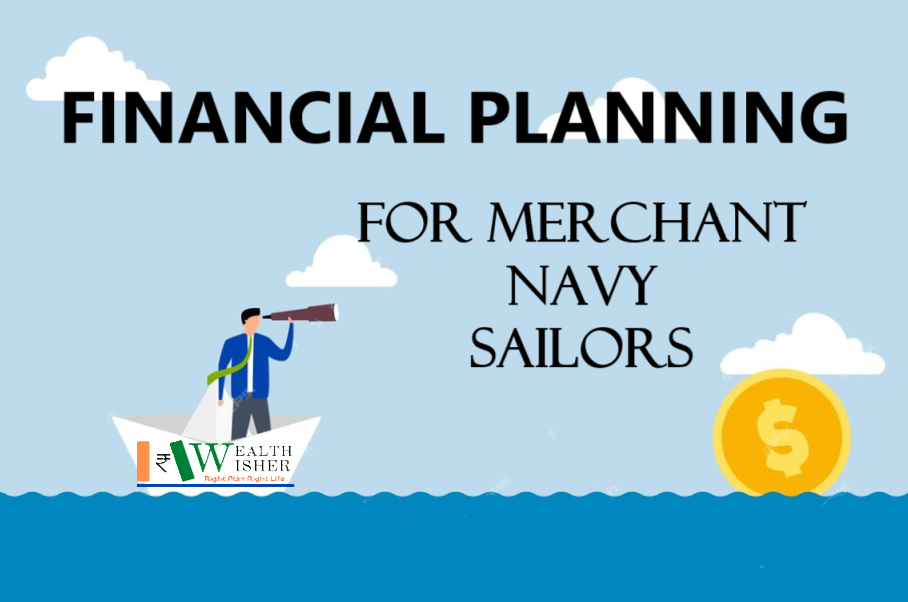Last week we wrote on the taxation aspect of the Merchant Navy & Seafarers community. The response had one thing in common – how can the process of investment start? Well, like other investors it starts with something called – Financial Planning. So this time let us cover the important topic – Financial Planning for Merchant Navy Sailors.
We have tried to cover what is financial planning in general, and how the Merchant Navy or Seafarers can benefit from this. What is the process of Financial Planning?
Financial Planning for Merchant Navy & Sailors
Financial planning is a critical aspect of life that ensures stability, growth, and peace of mind. For merchant navy sailors, whose profession involves long periods away from home, financial planning becomes even more essential.
The unique nature of their job, with irregular incomes and extended periods at sea, requires tailored financial strategies to secure their future and manage their finances effectively.
Importance of Financial Planning 
Financial planning is vital for several reasons:
- Income Management: Merchant navy sailors often receive lump-sum payments, which need to be managed wisely to cover expenses during both on-shore and off-shore periods.
- Investment Growth: Proper planning helps sailors invest their hard-earned money in various instruments, ensuring growth and financial security.
- Retirement Planning: Given the physically demanding nature of the job, sailors need to plan for an early and comfortable retirement.
- Family Security: Financial planning ensures that the sailor’s family is financially secure, even during unforeseen circumstances.
- Tax Efficiency: Proper planning can help sailors minimize their tax liabilities, optimizing their net income.
Financial Planning for Merchant Navy – Process
The financial planning process involves several steps:
- Setting Financial Goals: The first step is to identify short-term and long-term financial goals. These could include buying a house, children’s education, and retirement planning.
- Assessing Current Financial Situation: This involves evaluating current assets, liabilities, income, and expenses to understand the starting point.
- Creating a Financial Plan: Based on the goals and current situation, a comprehensive financial plan is developed. This includes budgeting, investing, insurance planning, and retirement planning.
- Implementing the Plan: Once the plan is in place, the next step is to put it into action. This involves making the necessary investments, purchasing insurance, and setting up automatic savings plans.
- Monitoring and Reviewing: Financial planning is not a one-time activity. It requires regular monitoring and adjustments based on changing circumstances and goals.
Once you set this financial plan, this can be implemented and your journey toward investing starts.
Check Out The Financial Planning Services by TheWealtWisher @INR999
Managing Finances While Sailing
Managing finances while at sea can be challenging due to limited access to financial institutions and services. Here are some strategies to help merchant navy sailors manage their finances effectively:
-
Automate Your Finances
-
- Open correct banks. Complete KYC Process.
- Automatic Transfers: Set up automatic transfers to savings and investment accounts.
- Mandates & Bill Payments: Automate bill payments to avoid missing due dates. Most banks offer automatic bill payment services that can be set up online.
- Using Online Banking & Mobile Apps: These can be used to monitor accounts, transfer funds, make investments, pay taxes, and pay bills.
-
Emergency Fund
Build an Emergency Fund: Save at least six months’ worth of expenses in an easily accessible account. This fund acts as a financial cushion in case of emergencies or unexpected expenses.
-
Invest Wisely By –
-
- Diversify Investments: Spread your investments across different asset classes, such as stocks, mutual funds, fixed deposits, and real estate. Diversification reduces risk and ensures a balanced portfolio.
- Mutual Funds: Consider investing in mutual funds through systematic investment plans (SIPs). SIPs allow you to invest a fixed amount regularly, making it a disciplined and effective way to build wealth over time.
-
Retirement Planning
-
- Retirement Accounts: Contribute to retirement accounts like the Employees’ Provident Fund (EPF) and the National Pension System (NPS). These accounts offer tax benefits and help build a retirement corpus.
- Insurance: Purchase adequate life and health insurance to protect yourself and your family. Health insurance is particularly important, given the nature of the job and the risks involved.
-
Financial Education
-
- Stay Informed: Keep yourself updated on financial matters by reading books, attending webinars, and following financial news. Knowledge is power, and being informed helps you make better financial decisions.
- Consult Financial Advisors: Consider seeking advice from a certified financial planner. They can provide personalized advice and help you navigate complex financial matters.
-
Regular Review and Adjustment
-
- Periodic Review: Regularly review your financial plan to ensure it aligns with your goals and current situation. Make adjustments as needed to stay on track.
- Stay Flexible: Be open to changes and adapt your plan based on new opportunities or changes in your life circumstances.
Financial planning is crucial for merchant navy sailors due to the unique challenges and opportunities they face. By setting clear financial goals, automating finances, investing wisely, and staying informed, sailors can ensure a secure and prosperous future for themselves and their families.
I hope this comprehensive guide helps you navigate the seas of financial planning effectively. If you have any questions or need further assistance, feel free to ask! Email me on madhupam@thewealthwisher.com.








